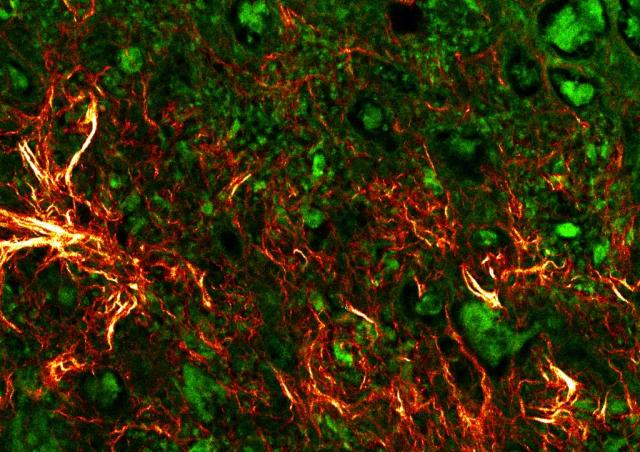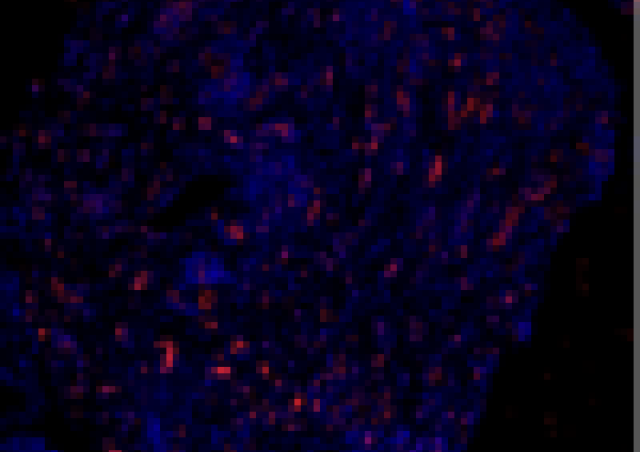Project members
Project
The female reproductive tract is composed of the ovaries, the fallopian tubes, the uterus, the cervix and the vagina. Immune cells and derived cytokines are present in these tissue and their amount is notably influenced by the hormonal cycle and the microbiota. Dysfunction in the female reproductive tract is associated with several pathologies such as endometriosis, adenomyosis, infertility, pregnancy loss and complications.
We are studying how immune cells are involved in these pathologies and how modulating them could represent new therapeutic avenues.
Endometriosis is a chronic hormone-dependent fibro-inflammatory gynecological disease. It affects nearly 10% of women of childbearing age and clinically results in intense pelvic pain and infertility. The disease is related to the presence of ectopic endometrium that forms cystic lesions on the ovaries and in the peritoneal cavity. The pathophysiology of this disease is poorly understood and our group has helped to elucidate certain mechanisms such as the role of oxidative stress, the activation of MAP Kinase and the mTOR / Akt pathway. Our group is particularly interested in the different adaptive or innate immune components of the chronic inflammatory response that characterizes the disease.
The gut microbiota which affects various physiological and pathological processes, such as those involving the nervous and endocrine systems and immunity, plays an important role in endocrine and inflammatory diseases. The microbial signature linked to different disorders such as endometriosis, bacterial vaginosis and gynecological cancers is described. A new study on the impact of microbiome quality under the influence of antibiotics, probiotics or diet on the development of endometriosis is underway.
Recently, we have also undertaken the study of the consequences of endometriosis during assisted reproduction and pregnancy: from fertilization / early embryonic development (non-interventional clinical study EndOvo NCT03241329) to pregnancy outcomes (prospective clinical study EndObst NCT02498691), and using a mouse model of endometriosis associated with gestation (allowing to study the tissues of interest at all stages of gestation, PlacentAtlas project). Thus, our team conducts fundamental as well as clinical research and is associated with the departments of gynecology, assisted reproductive technology, and immunology from Cochin Hospital.


MultiMENDo Project: Endometriosis and menstrual blood
In 2023, the team received funding from the European Research Council (ERC) for the MultiMENdo project : Menstrual Fluid MultiOmics Analysis to better Diagnose, Understand and Treat Endometriosis
This project aims at finding diagnostic biomarkers and prognostic biomarker candidates, as well as investigating new therapeutic approaches for endometriosis using menstrual blood, a relevant and easily accessible yet overlooked biological fluid.
The main hypothesis for endometriotic lesion formation is retrograde menstruation (menstrual fluid reflux through the fallopian tubes) but the precise pathogenesis remains unclear. There are no noninvasive biomarkers currently used in clinical care
but they are essential to improve the diagnosis delay, currently estimated at 8 years. There is no specific treatment and pharmacological options are contraceptive.
With this project, we propose to use menstrual fluid as a relevant biological fluid for endometriosis.
In Aim 1, single-cell transcriptomics and soluble protein multiplex assays on 64 menstrual fluid samples will be used to identify candidate diagnostic biomarkers that differentiate endometriosis affected women from healthy controls. Validation of these
biomarkers will be carried out in menstrual fluid samples from 250 women. In Aim 2, menstrual fluid derived organoids cultured with or without immune cells will be used to assess endometriosis associated functional changes and to test new
immunomodulatory treatments. In Aim 3, longitudinal cohorts will be established to identify prognostic candidate biomarkers for response to surgery and in vitro fertilization.
Diagnostic and prognostic biomarkers are essential to assess disease establishment, evolution and to choose the most appropriate treatment. This project will enhance our understanding of endometriosis pathophysiology as well as allow the study of a new biological fluid, relevant to gynecologic and reproductive disorders.






















